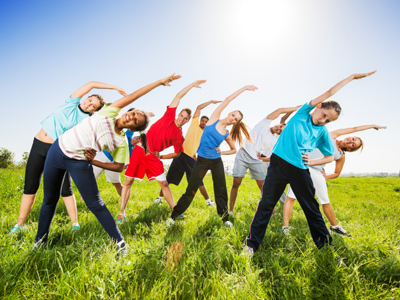
Ask the AI Tutor
Need help with Unit 2 - Effects of Exercise? Ask our AI Tutor!
AI Tutor - Lucy
Connecting with Tutor...
Please wait while we establish connection

During exercise, the blood leaving the muscles contains a higher amount of carbon dioxide.
Unit 2 - Effects of Exercise
This GCSE Biology quiz explores how exercise affects your heart, lungs and muscles, including changes in breathing rate, lactic acid build up and recovery after activity.
1 .
Which of the following is a waste product of muscles respiring anaerobically?
Oxygen
Ammonia
Lactic acid
Carbon monoxide
Lactic acid makes muscles tired and sore after prolonged exercise. It is produced when oxygen levels are low
2 .
Which of the following statements is true of the blood leaving the muscles during exercise?
The blood leaving the muscles during exercise has more oxygen
The blood leaving the muscles during exercise has less water
The blood leaving the muscles during exercise has more carbon dioxide
The blood leaving the muscles during exercise has less nitrogen
This is a waste product from aerobic respiration
3 .
Blood supply to the respiring muscles increases during exercise. This is to supply the muscles with more of what?
More glucose
More carbon dioxide
More nitrogen
More water
Glucose is the 'fuel' that is oxidised during aerobic respiration
4 .
During exercise, what happens to the heart rate?
It decreases
It increases
It is unchanged
It decreases then increases
Before exercise, it is advisable to spend time 'warming up' so that your heart rate increases gradually
5 .
What do muscle cells break down in order to release energy?
Protein
Glycogen
Cholesterol
Oxygen
The body can break this down during exercise to increase the concentration of glucose in the blood
6 .
When muscles are deprived of oxygen, how do they respire?
Aerobically
Acidly
Acerbically
Anaerobically
This only releases a small amount of energy so your muscles feel tired and don't function as well as they do during aerobic respiration
7 .
Which type of the blood vessel supplies blood to the muscles?
Lymph
Artery
Vein
Aorta
Arteries carry oxygenated blood round the body. They split to form blood capillaries with thin walls that allow the oxygen to pass out of the blood to the individual muscle cells
8 .
Which of the following is the stored form of glucose, found in the liver and muscles?
Glucagon
Glucagen
Glycogen
Glycose
Glucose cannot be stored as glucose so your body converts it into glycogen
9 .
Which type of the blood vessel removes blood from the muscles?
Artery
Aorta
Vein
Lymph
Capillaries take lactic acid and carbon dioxide from the muscle cells into the veins, away from the muscle cells
10 .
The rate and depth of breathing increases during exercise. This is in order to give the muscles more of what?
More oxygen
More carbon dioxide
More glycogen
More nutrients
Oxygen is required for aerobic respiration
**Unlimited Quizzes Await You! 🚀**
Hey there, quiz champ! 🌟 You've already tackled today's free questions.
Ready for more?
Ready for more?
🔓 Unlock UNLIMITED Quizzes and challenge yourself every day. But that's
not all...
not all...
🔥 As a Subscriber you can join our thrilling "Daily Streak" against other
quizzers. Try to win a coveted spot on our Hall of Fame Page.
quizzers. Try to win a coveted spot on our Hall of Fame Page.
Don't miss out! Join us now and keep the fun rolling. 🎉
**Unlimited Quizzes Await You! 🚀**
Hey there, quiz champ! 🌟 You've already tackled today's free questions. Ready for more?
🔓 Unlock UNLIMITED Quizzes and challenge yourself every day. But that's not all...
🔥 As a Subscriber you can join our thrilling "Daily Streak" against other quizzers. Try to win a coveted spot on our Hall of Fame Page.
Don't miss out! Join us now and keep the fun rolling. 🎉






